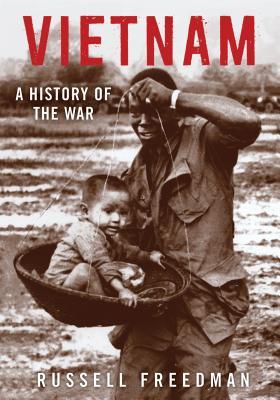NONFICTION MONDAY: Vietnam
ABOUT THE BOOK
Was the Vietnam War a tragic mistake? Or was it, as President Ronald Reagan would claim, "a noble cause"?
In an enthralling book, Newbery Medalist Russell Freedman provides a succinct account of perhaps the most puzzling and contentious of America s wars. Describing how a superpower caught up in Cold War politics became increasingly enmeshed in a conflict over 8,000 miles away, he then explains why twenty years later an exit was so difficult. In words and photographs he chronicles the unfolding events in Vietnam and at home as increasing numbers of young men were sent into the jungles to fight.
After assessing the catastrophic damage, Freedman concludes the book with a hopeful epilogue on Vietnam today.
A glossary, source notes, bibliography and index are included.
REVIEW
I've long believed that the Vietnam War was a tragic mistake, reading this book has only confirmed that belief in my mind. I've always loved reading Freedman's books, they are always eminently readable and easy to follow. I'm sad that with his death, there won't be many more like this one to share with young people. Freedman begins by telling about the march on Washington by 2000 Vietnam War veterans who believed the war was wrong. Freedman then goes back and provides background information on Vietnam and the years leading up to the actual fighting that became known as the Vietnam War even though war was never officially declared by Congress. The years leading up to the war were hard ones for Vietnam, they weren't a wealthy country and as a small country they were often at the mercy of their northern neighbor (China). After France made Vietnam their colony, the desire for independence started to become an actual political movement. A brief history of Vietnam's experiences during and after World War II opened my eyes as to why Vietnam turned communist. The irony is that after World War II, America had the chance to help Vietnam become an independent democratic country but chose to support France's desire to get their colony back instead.
But many Vietnamese refused to succumb to the French demands and the conflict that would rage almost unbroken for the next thirty years began. When the French proved unable to tame the demands for independence, America stepped in, supposedly to stop the spread of communism. But the supposed democratic government that the U.S. helped install turned out to be a brutal dictatorship instead. And events carried us into war when it became apparent that the South Vietnamese wouldn't be able to defeat the North on their own. It's sickening to realize however that what kept us at war wasn't a so-called 'noble cause' but leaders who couldn't bear the thought of losing a war. It was only as American citizen's opposition increased that thoughts of withdrawal were even considered. And even then it took several more years before it actually happened. Freedman's account of war provides a great overview of a conflict that even today is controversial. The stories told here are worth hearing and powerfully told.
ABOUT THE BOOK
In March 1965 President Lyndon B. Johnson sent troops into Vietnam. 57,939 American soldiers would be killed and seventeen years would pass before this controversial chapter of American history concluded with the dedication of the Vietnam Veterans Memorial in 1982.
The history of this era is complex; the cultural impact extraordinary. But it's the personal stories of eight people--six American soldiers, one American nurse, and one Vietnamese refugee--that form the heartbeat of Boots on the Ground. From dense jungles and terrifying firefights to chaotic medic rescues and evacuations, each individual's story reveals a different facet of the war and moves readers forward in time. Alternating with these chapters are profiles of key American leaders and events, reminding readers what was happening at home, including Kent State, Woodstock, and Watergate.
REVIEW
Russell Freedman's Vietnam: A History of the War gives a great overview of the war. It focuses on the politics and general strategies. Boots on the Ground focuses on individual experiences. Based on interviews as well as numerous primary source documents, Partridge has created a powerful reading experience. The experiences of both some of the primary decision makers (Presidents Kennedy, Johnson, and Nixon) are combined with the experiences of a variety of on the ground service people including a nurse, a medic, a green beret, a machine gunner, and an infantryman. In addition, the experiences of a variety of others are also included: a protester, a protest singer, a refugee, a veteran, and the memorial designer also have a chance to share their experiences. I appreciate Partridge's attempt to cover many different aspects of the war. With these first person accounts, the war came to life in a way a basic history book does not. The writing is fabulous and the photographs add a glimpse into the experiences shared. A nice complement to Freedman's Vietnam.
ABOUT THE BOOK
It was the war that lasted ten thousand days. The war that inspired scores of songs. The war that sparked dozens of riots. And in this stirring chronicle, Pulitzer Prize- winning journalist Philip Caputo writes about our country's most controversial war -- the Vietnam War -- for young readers. From the first stirrings of unrest in Vietnam under French colonial rule, to American intervention, to the battle at Hamburger Hill, to the Tet Offensive, to the fall of Saigon, 10,000 Days of Thunder explores the war that changed the lives of a generation of Americans and that still reverberates with us today.
Included within 10,000 Days of Thunder are personal anecdotes from soldiers and civilians, as well as profiles and accounts of the actions of many historical luminaries, both American and Vietnamese, involved in the Vietnam War, such as Richard M. Nixon, General William C. Westmoreland, Ho Chi Minh, Joe Galloway, Dr. Martin Luther King Jr., Lyndon B. Johnson, and General Vo Nguyen Giap. Caputo also explores the rise of Communism in Vietnam, the roles that women played on the battlefield, the antiwar movement at home, the participation of Vietnamese villagers in the war, as well as the far-reaching impact of the war's aftermath.
Caputo's dynamic narrative is highlighted by stunning photographs and key campaign and battlefield maps, making 10,000 Days of Thunder THE consummate book on the Vietnam War for kids.
REVIEW
Caputo's book is a combination of personal experiences and a history of many aspects of the war. In short two page spreads, Caputo looks at many aspects of the Vietnam War, including the politics, the leaders, the presidents, the air, ground, and sea aspects, etc. Each spread also includes short factoids, along with large black and white and color photographs. The combination of a thorough coverage of many aspects of the war with specific experiences makes for a compelling read. The short sections work especially well for reluctant readers who have a hard time focusing on one topic. As an adult reader, I would have liked more detail on each topic, but it works well as an introduction to a complex event and the many experiences associated with it.






Comments
Post a Comment